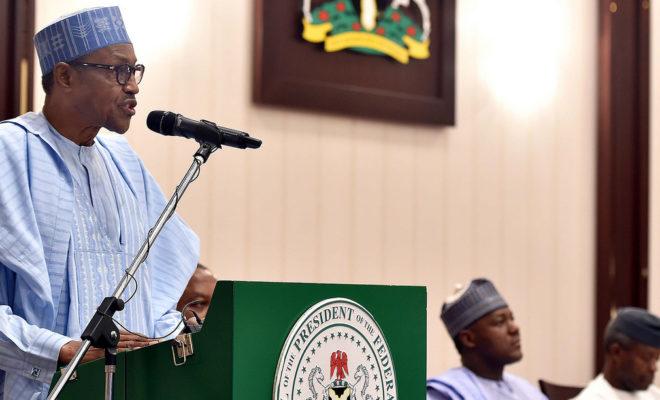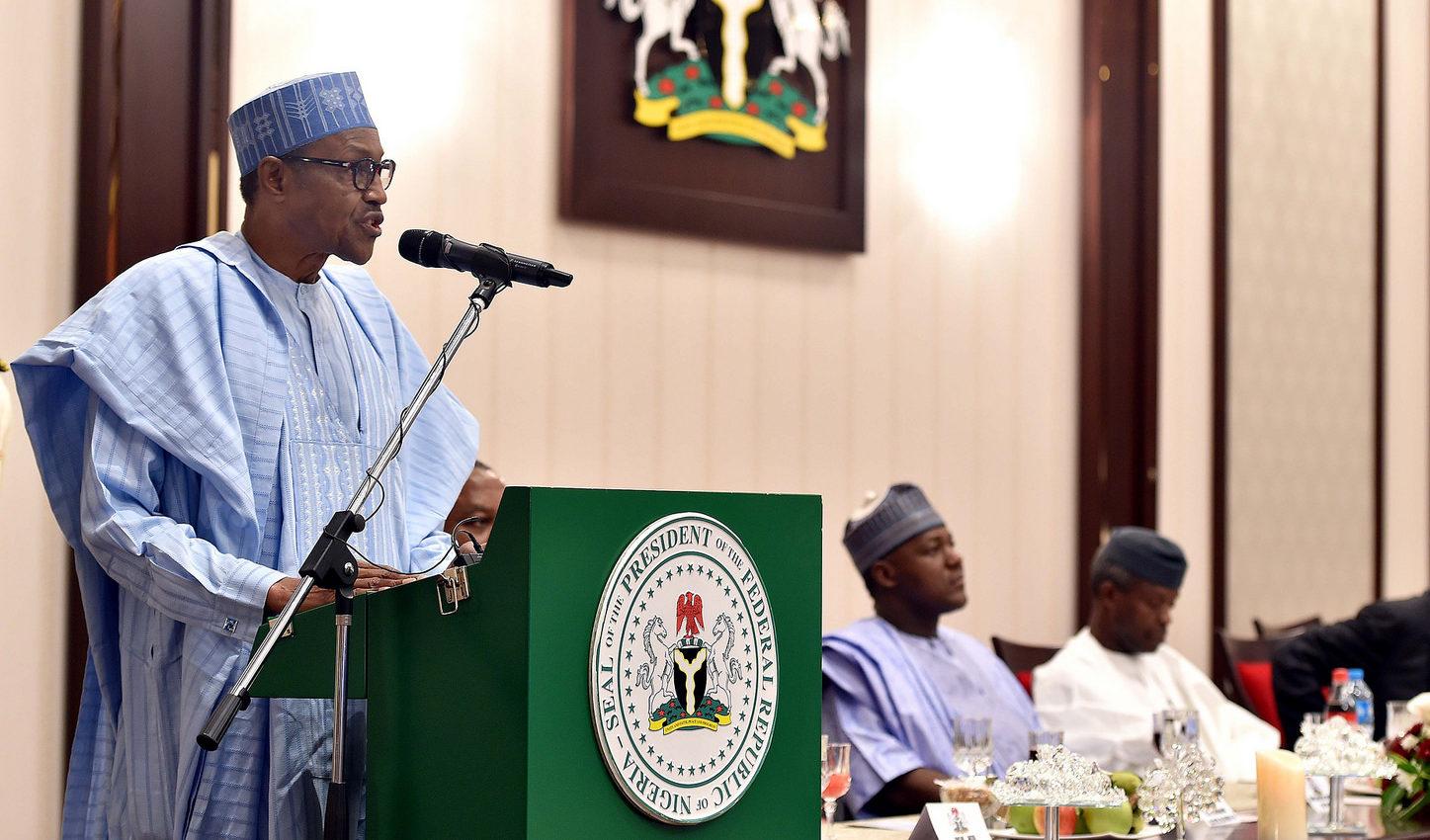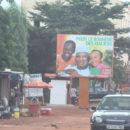Nigeria: After Buhari…?

With the president on medical leave again, ambitious figures are positioning themselves favourably for what might happen next.

Several influential politicians are watching Buhari’s ongoing medical problems closely. Credit: GCIS.
Secrecy creates suspicion. In the cutthroat arena of Nigerian politics, it can also reveal ambition. The ongoing silence around of the health of Nigeria’s president has done just this.
For several weeks, Muhammadu Buhari has barely been seen in public. And on 7 May, he sought medical treatment in London, where he previously spent nearly two months from mid-January to March for the same reasons.
Now as then, the lack of information about his diagnosis has led to great uncertainty and speculation back in Nigeria.
On leaving, Buhari handed over the reins to Vice-President Yemi Osinbajo. But unlike in previous instances when the vice-president stepped into the constitutionally-mandated role of Acting President, Osinbajo is now only “Coordinator of National Affairs”.
[Nigeria: While Buhari’s away…]
According to Sola Tayo, Associate Fellow at Chatham House, this reduced position may be indicative of the “reluctance of the president to totally relinquish power during his absence”.
However, this has only added to confusion and questions over where the power lies while Buhari is away. Osinbajo, whose previous stints standing in for his boss earned him wide praise, may be officially in charge. But the president’s inner circle – a group led often referred to as “The Cabal” – is the most influential power bloc in the presidency and may be eager to curtail the vice-president’s growing influence.
Either way, as the 2019 elections draw closer and Buhari’s health problems continue, ambitious figures within the ruling All Progressives Congress (APC) are sensing an opportunity to position themselves favourably. The president’s absence has kick-started another cycle of intrigue, relegating policymaking and much needed debates over the economy once again.
Who’s in charge?
Buhari’s presidency since he came to power in 2015 can at best be described as lacklustre. Nigeria is witnessing its worst economic crisis in a generation, unemployment is high, and there has been renewed insecurity in the Niger Delta and the east.
[Nigeria: Buhari’s southern dilemma heating up]
Buhari, a retired Major General who ruled Nigeria as a military dictator from 1983-5, has reverted to type. He has been open about his disdain for Abuja politics and has surrounded himself with a small group of family members and trusted allies from his days in the Congress for Progressive Change (CPC).
[Nigeria: The shattering of the Buhari mythology]
Influential figures such as Chief-of-Staff Abba Kyari, Director-General of the Department of State Services (DSS) Lawal Daura, and his nephew Mamman Daura, are said to be in full control of the state apparatus.
Because of this, many within the ruling APC feel short-changed. Several figures invested heavily in Buahri’s election victory, both politically and financially, expecting to have a significant role in government. But they have only seen their influence decline with the party in power.
The president’s medical leave, however, presents an opportunity for these individuals to strategise in the event that Buhari cannot continue. Several bigwigs appear to be watching developments with very keen interest.
Contenders in waiting?
Bola Tinubu, former Governor of Lagos and national leader of the APC, is one of these individuals. He remains one of the country’s most influential politicians and has the support of a major faction within the APC. His immense contribution towards Buhari’s electoral campaign reportedly earned him the right to nominate his political godson Osinbajo as vice-president.
Tinubu, who is understood to have sought the VP position for himself until he was forced to shelve his ambition by the party hierarchy, might sense that the time is now right to bring his influence to bear. Asked in February if he would run for president in 2019, he said: “I will not brush aside such an aspiration…Maybe as a senator, maybe as a president, you cannot rule it out”.
Another figure whose ambitions are well-known is Senate President Bukola Saraki, who has recently cemented his authority in the Upper House. Back in 2010, when then President Umara Yar’Adua was severely ill, the Senate voted to hand over presidential powers to then VP Goodluck Jonathan. If a similar move were attempted today, Saraki as Senate president would be a crucial powerbroker.
[Nigeria: Could “the rift” derail President Buhari’s agenda?]
This position makes Saraki a much coveted ally for both Buhari’s inner circle and those eyeing the presidential seat. It also positions him well for a potential run for the presidency in 2019. Saraki previously put himself forwards a presidential candidate when he was a member of the Peoples Democratic Party (PDP).
Atiku Abubakar, an APC bigwig, major party financier and former vice-president, has also reportedly been manoeuvring himself in recent months. He has made pronouncements on the need to restructure the country and visited influential decision-makers and traditional rulers. These moves are seen as laying the foundation for a possible presidential bid.
A final player who is believed to have high ambitions is Governor of Kaduna State Nasir El-Rufai, who is positioning himself as a figure of continuity . He has spoken out in defence of Buhari and in a recently leaked memo to the president, declared that “our APC administration has failed” and insisted that Buhari is Nigeria’s “only hope now”. El-Rufai has argued that Buhari should contest again in 2019, or at least have a strong say in his successor.
History repeating?
An addition complication to any talk of succession is Nigeria’s delicate ethnic balance. Since the return to multi-party democracy in 1999, the country has had an informal agreement that the presidency will rotate every eight years between the mostly Muslim north and predominantly Christian south.
This arrangement was seriously tested in 2010 with the death of President Yar’adua, a northerner, just three years into his term. When this happened, the reins were officially handed over to his vice-president Jonathan, a southerner. Jonathan not only refused to stand aside for a northern candidate at the time, but went on to contest and win the 2011 elections and serve a full term. He ran again in 2015, but lost to northerner Buhari.
Now with Buhari looking frail, history is threatening to repeat itself. Figures within both the ruling APC and main opposition Peoples Democratic Party (PDP) have insisted that their candidates for 2019 must come from the north. But sensitivities remain, and some suggest that Vice-President Osinbajo has to tread carefully while standing in for Buhari.
“Many believe that Osinbajo will actually get things working more effectively in the president’s absence, but he must appear loyal to his boss and must not be seen to be outshining him,” says Ohimai Amaize, a former ministerial advisor and publisher of SIGNAL online newspaper.
With Buhari on medical leave, temperatures back home are rising. His inner circle will be trying to dampen attempts at political manoeuvring, but the secrecy around the president’s health is only emboldening his would-be successors. According to political analyst Matthew Page, this “will only intensify the longer President Buhari receives medical treatment in London”.
Precedence has already been set for the powers of the presidency to be handed over in the event of their inability to continue in office. Ongoing mystery about Buhari’s well-being and capacity to fulfil his duties could encourage such actions again. The complexities of such an eventuality could threaten not just the sitting president, but the political establishment as a whole.







I wish President Buhari gets well soon. The country needs an honest, good and strong leader like him. At least if he is well, the country can run smoothly with the Vice-President doing the main bulk of his work (because of his health condition). Mat God Bless President Buhari and his family.
I will vote for Buhari even in sickbed because he is better than all other candidate (womowumi adebay sebiotimoithin and outside APC). As for our corrupt senators they have no other agenda than how to remove Magu and Hamid Ali.
Nigeria a country where things are turned upside down because of religio ethnic interest. Everyone is watching
The last time this patriotic Nigerian leader, Buhari, was destined to take Nigeria off being classified as a “crime scene”, corrupt power-hungry army officers ganged up and removed him by force and took Nigeria down the path of corruption never known in human history.
Now he is up at it again, I pray God Almighty spare him the life and health to salvage this, but for corruption, would have been one of the greatest nations on earth.
The credit and non-credit given to President M. Buhari of Nigeria needs a critical evaluation. What is the source of the information? You must understand the political environment of the country to accept any of the opinions issued. Ethnicity, religion, politics, and even education are the wings direction of power in Nigeria. The Yoruba Tribe shows a gentleman’s altitude in national affairs when they privately address their interests as they plan a public attack. The Igbo Tribe, a very educated group, who are cable of ruling the country is struggling with their individual ambition, and would not rally around a good son or daughter to pilot the nation. Because of the marginalization of this group, you can easily break majority of them up with gifts, (divide and conquer). The other tribe is the Hausa. The first two believe that they have been in power too long, and uses religion for ruling Nigeria. Late M. G. of Libya may be blamed for this problem. His influence on Nigerian national politics and religion cannot be ignored. But an area that we cannot overlook is the balance of ethnicity in Nigerian Forces, and their influence in national politics. Military power is a strong agenda in Nigerian politics, if you know the national history. The Igbo had their hands at the on set in the Nigerian military, when the first true General of the Nigerian Army Aguiyi Ironsi was murdered in a revenge coup by the Hausa military youths.
The death of a president of a nation should never be prayed for. Mr. Dilip De and Mr. Umaru Yusuf favor this stand. A democratic disposal of a president is more glamoruse than his/her death while the leader is in office. This calls into question the President of Nigeria, former Major General M. Buhari. As he ages, he is facing serious health and life issues, admit it or not. Buhari, who is his 80s is over working his life. The demand of the job is too much stress on such an old man. If he is not dealing with realities, we will soon realize that we should have advised him……..
A fair and intriguing opinion. That said, however, one cannot but notice a near complete misinterpretation of the Buhari myths. Foe one it isn’t that JEG and the PDP lost to Buhari on account of either ethnic/faiths bias, no, ‘they’ lost because Nigerians were simply fed-up with the duo.
On the Buhari persona perhaps many if not most of his are=dent supporters failed or refused to understand Buhari. He has an impressive anti-corruption toga but governance needs far more than just that. As a military trained person he grasps the needs and requirements of the military more than most. But he also has this personal ‘so-what’ attitude. That was what made his presidency so noisy, loud and at the same time deafeningly silent. Look back a how the speaker and senate president emerged and you could see the handwriting clearly but?
Even the sickness issue remains that Buhari as a person somehow believed it is the business of no one but himself and that is the cause of his handlers, his opponents, supporters and literally everyone drawing his own line red, white and all colours. That is the misunderstood Buhari phenomena for you. The positionings, inner fights and all cannot undo much of that wall but Nigeria is sure to emerge much more coherent and united if we begin to stand up for the issues not the distractions thrown up by political grapplers that have brought us to this point.